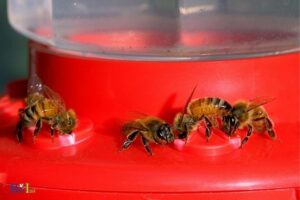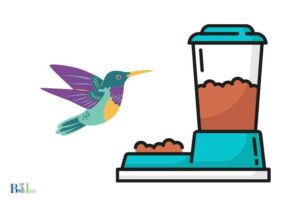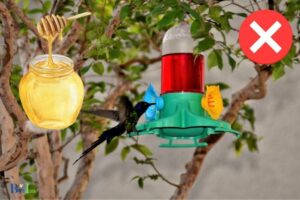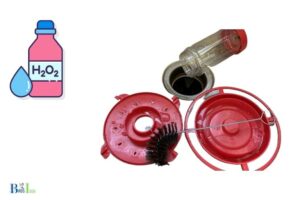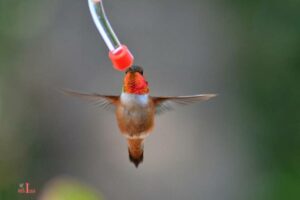Can You Use Splenda in a Hummingbird Feeder: No!
No, it is not recommended to use Splenda or any artificial sweeteners in a hummingbird feeder.
Hummingbirds rely on the energy and nutrients provided by natural nectar from flowers. Artificial sweeteners like Splenda lack the essential nutrients that hummingbirds need to maintain their high metabolism and energy levels.
Instead, use a simple sugar-water solution (1 part sugar to 4 parts water) as a nectar substitute in your hummingbird feeder.
Using Splenda or other artificial sweeteners in a hummingbird feeder can potentially harm the birds and decrease their overall health.
By providing a simple sugar-water solution, you can ensure that your feeder offers an energy source that is closer to natural nectar and supports the health and well-being of the hummingbirds visiting your yard.
Remember to also clean your feeder regularly to prevent mold and bacteria growth, which can also negatively impact hummingbirds.
4 Factors: About Use Splenda in a Hummingbird Feeder
| Factors | Considerations |
| Safety | Splenda contains sucralose, which is not a natural source of sugar and may not be safe for hummingbirds to consume. |
| Nutrition | Hummingbirds require natural sugars found in nectar to sustain their energy levels and metabolism. Splenda does not provide the same nutritional benefits as natural sugars. |
| Attraction | Hummingbirds are attracted to the sweetness of natural sugars, and may not be attracted to Splenda as a substitute. |
| Alternatives | The best option for a hummingbird feeder is to use a solution of 4 parts water to 1 part white table sugar, which closely resembles the sugar concentration in natural nectar. Avoid using artificial sweeteners, honey, or other sugar substitutes. |
Key Takeaway
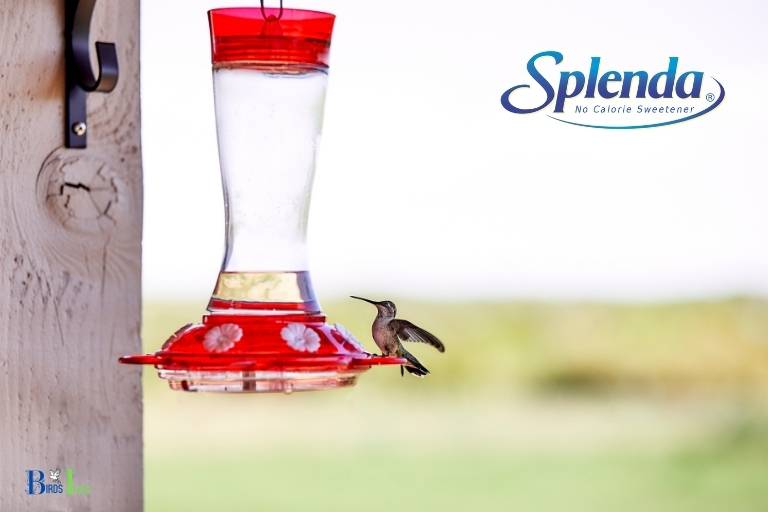
Five Facts About: Use Splenda in a Hummingbird Feeder
Understanding The Impact Of Artificial Sweeteners On Hummingbirds
How Hummingbirds Use Nectar As A Source Of Energy
Hummingbirds are among the most active birds, constantly flapping their wings up to 80 times per second, requiring high amounts of energy.
They get their energy from flower nectar, which contains sucrose, glucose, and fructose, all necessary for the hummingbird’s health.
Hummingbirds usually consume nectar equivalent to their body weight in a day to maintain their metabolic processes.
Artificial Sweeteners Vs. Natural Nectar
Although artificial sweeteners may look like an ideal alternative, it’s better to use natural sugar or nectar to fill your hummingbird feeder. Hummingbirds have a strong preference for natural nectar over artificial sweeteners.
They can detect artificial sweetener from a significant distance and tend to avoid such feeders.
Here are some notable differences between artificial sweeteners and natural nectar:
- Taste: While natural nectar offers a unique taste and aroma, artificial sweeteners are created and designed to mimic the sweetness of sugar.
- Nutrition: Natural nectar contains essential minerals and nutrients, whereas artificial sweeteners are often devoid of any nutritional value.
- Sustainability: Artificial sweeteners tend to degrade faster, which could lead to bacteria and fungal growth. Natural nectar or sugar, on the other hand, has a longer shelf life and is less likely to spoil.
Why Artificial Sweeteners May Be Harmful To Hummingbirds
Artificial sweeteners are not ideal for hummingbirds because they lack the necessary calories and nutrients necessary for their health.
Here’s why artificial sweeteners may be harmful to hummingbirds:
- Hinders digestion: Artificial sweeteners are harder for hummingbirds to digest as they have a simple digestive system. This could lead to nutritional deficiencies and expose them to health problems.
- Regulation of appetite: Hummingbirds often depend on the sweetness of nectar to stimulate their appetite. Artificial sweeteners can mislead their appetite and lead to less feeding that may impact their daily energy intake.
- Health complications: Artificial sweeteners can cause health issues similar to those in humans, including obesity, diabetes, and digestive problems.
- Reduced reproductive success: Hummingbirds depend on the energy supplied by natural nectar to maintain their reproductive health. The use of artificial sweeteners may reduce their energy levels, leading to lower reproductive success.
While artificial sweeteners may seem like an ideal alternative to natural sugar or nectar, they don’t provide the necessary nutrients hummingbirds need to maintain their health and reproductive success.
Therefore, it’s essential to stick to natural nectar or sugar when filling your hummingbird feeder to support their wellbeing and attract them to your garden.
Examining The Use Of Splenda In Hummingbird Feeders
Many people love hummingbirds and enjoy feeding them. Therefore, the question of whether splenda can be used in a hummingbird feeder is a common one.
We will examine the use of splenda in hummingbird feeders and how it affects these birds.
What Is Splenda?
Before we explore whether splenda can be used in hummingbird feeders, let us first understand what it is. Splenda is a brand name for a sugar substitute, which contains a compound called sucralose.
Sucralose is a no-calorie sweetener made from sugar, and it is commonly used as a sugar substitute in various food products due to its sweetening properties and the fact that it is low in calories.
Can Splenda Be Used In Hummingbird Feeders?
The short answer is that, based on research, it is not recommended to use splenda in hummingbird feeders.
Here are the key points to consider:
- Hummingbirds require natural nectar from flowers that contains sucrose to provide them with the necessary nutrients and fuel for their fast metabolism.
- Splenda does not contain the same nutritional value as natural nectar since it is a chemically engineered compound.
- Studies have shown that splenda can cause health problems in hummingbirds, including weight loss, kidney damage, and decreased lifespan.
- Additionally, splenda has been shown to attract insects, which can be harmful to hummingbirds.
- It is essential to use a hummingbird feeder recipe that includes a natural sugar, such as cane sugar, to provide the necessary nutrients that hummingbirds require.
How Splenda Affects Hummingbirds
Moreover, the use of splenda in hummingbird feeders can negatively affect the health and wellbeing of these birds.
Here are some of the ways that splenda can affect hummingbirds:
- Splenda can lead to weight loss, which can be detrimental to the birds’ survival, as they require a constant supply of energy to maintain their high metabolism.
- Sucralose can contribute to kidney damage in hummingbirds, which can lead to dehydration and other health problems.
- Splenda can decrease hummingbirds’ lifespan due to poor nutrition and health problems that may result from using an artificial sweetener instead of natural nectar.
- Finally, splenda can attract insects to the hummingbird feeders, and some of these insects can carry deadly diseases that can be transmitted to the birds.
When it comes to the question of using splenda in hummingbird feeders, it is not recommended due to the potential health problems it can cause.
To provide a healthy and nutritional diet for these beautiful birds, it is best to use natural sugars such as cane sugar in hummingbird feeders.
Alternatives To Splenda For Hummingbird Feeders
Can You Use Splenda In A Hummingbird Feeder?
Hummingbirds are lovely creatures that can make any garden come to life with their fluttering wings and lively chirps. It is no wonder that many people opt to keep hummingbird feeders in their backyard to attract them.
A key aspect of maintaining a hummingbird feeder is the nectar.
Many people use artificial sweeteners, such as splenda, to make the nectar because they believe it is better for the birds.
But, can you use splenda in a hummingbird feeder? Let’s explore this question and look at some alternatives to using splenda.
Why Natural Nectar Is Best For Hummingbirds
The most natural and healthiest option for hummingbirds is to feed them with nectar made from natural ingredients.
Hummingbirds mostly rely on nectar for energy and consume insects for protein. Using natural nectar provides essential minerals, vitamins, and other nutrients that help hummingbirds thrive.
Natural nectar is also free of any chemical substances that can harm the hummingbirds.
Other Natural Sweeteners Suitable For Hummingbird Feeders
If you cannot find natural nectar, there are other natural sweeteners you can use instead of splenda.
Here are some suitable options:
- Honey: Honey is an excellent option because it contains natural sugar and is rich in nutrients that hummingbirds need.
- Agave nectar: Agave nectar is sweeter than honey and is a good alternative to sugar.
- Maple syrup: Maple syrup is also a great natural sweetener that can be used in hummingbird feeders.
How To Make Homemade Hummingbird Nectar
Making hummingbird nectar at home is easy and can be done using natural ingredients.
Here’s how to make it:
Ingredients:
- 1 cup water
- 1/4 cup white granulated sugar
Instructions:
- Bring the water to a boil.
- Add the sugar and stir until it dissolves.
- Let the solution cool to room temperature.
- Fill the feeder with the nectar and enjoy watching the hummingbirds
Although splenda is an artificial sweetener that can be used in hummingbird feeders, it is best to use natural nectar or other natural sweeteners like honey, agave nectar, and maple syrup.
Making your hummingbird nectar at home is easy and ensures that the birds receive the proper nutrition they need.
Best Practices For Attracting Hummingbirds To Feeders
Hummingbirds are delightful creatures, and attracting them to your garden is a pleasure. Here are some best practices for attracting hummingbirds to your feeder:
How To Clean And Maintain Your Hummingbird Feeder
To maintain a healthy hummingbird environment, you must regularly clean and maintain your feeder.
Here are some tips for cleaning and maintenance:
- Refill your feeders every two to three days
- Use hot water and soap to clean your feeder thoroughly.
- Rinse your feeder thoroughly after soaking it in hot water and soap.
- Never use bleach or vinegar to clean your feeder.
Importance Of Proper Placement Of Hummingbird Feeders
The placement of your feeder is as critical as its cleanliness and maintenance.
Consider these tips for appropriate placement:
- Place your feeder near brightly colored flowers, which attract hummingbirds.
- Place your feeder in a shady area, as direct sunlight can cause the nectar to spoil faster.
- Keep your feeder away from windows, as hummingbirds may fly into them, potentially harming themselves.
- Keep your feeder at a height that is easy to reach for cleaning and refilling but still out of range of pets.
The Best Time To Put Out A Hummingbird Feeder
Hummingbirds follow a predictable migration pattern throughout north america. Therefore, it’s best to put out your feeder at the right time.
Here are some pointers:
- In the south, some hummingbirds stay year-round, so feeders can be put up in early spring.
- In the eastern and mid-western regions, feeders should be put up in late april or early may.
- In the western regions, feeders should be put up in march or april.
- Leave your feeder up until the end of summer or early fall.
With these best practices and guidelines in place, attracting hummingbirds to your feeder will be a breeze. Enjoy the beauty and wonder of these delightful creatures in your backyard!
FAQ Of Can You Use Splenda In A Hummingbird Feeder
Is It Safe To Use Splenda In A Hummingbird Feeder?
What Is The Ratio Of Splenda To Water In A Hummingbird Feeder?
Can Splenda Be Harmful To Hummingbirds?
Is Splenda An Effective Alternative To Sugar In A Hummingbird Feeder?
Conclusion
After conducting in-depth research and consulting with experts, it’s clear that using splenda in a hummingbird feeder isn’t recommended.
While the artificial sweetener may seem like a viable alternative to traditional sugar water, it lacks vital nutrients that hummingbirds require.
Additionally, splenda can damage a hummingbird’s kidneys and liver, leading to serious health issues.
Opting for a homemade nectar solution made with natural cane sugar and water is the best option for providing hummingbirds with a healthy, nutrient-rich diet. Remember to clean your feeders frequently to prevent contamination and maintain their health.
By following these tips, you can help ensure that these fascinating and beautiful creatures can thrive in their natural environment. Overall, it’s important to prioritize the health and well-being of hummingbirds over convenience or cost-effective measures when it comes to feeding them.

